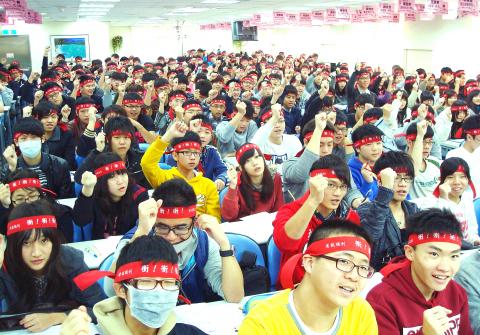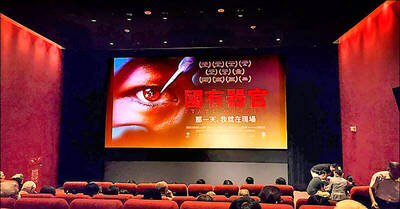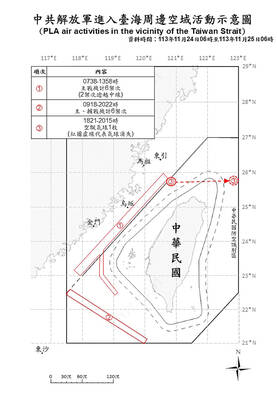Huang Hsing-yao knows exactly how to spend every hour of the day, every day of the week: bent over the books, preparing for the most important test of his life.
With little time left before the university entrance exam that will decide his future, the 18-year-old high school student’s life is marked by relentless study, most of it in a cram school in downtown Taipei.
“At the moment, I hardly have any free time. It’s all spent studying,” he said, sporting a cool-kid haircut, but wearing a blue-and-white school uniform. “Sometimes I relax a bit at home, but I still have to do some preparation.”

Photo: AFP
Taiwan is an education-obsessed society, due not least to a Confucian legacy that emphasizes personal improvement, and there are hundreds of thousands of young Taiwanese just like Huang.
Surveys show that eight in 10 high school students in Taiwan receive some kind of after-school tutoring to help them pass each hurdle in the education system to make it into the best universities and eventually get the best jobs.
The cram schools, whose bright logos grace the central area of every Taiwanese city, are a huge business in the country, with parents willing to pay thousands of dollars for what they consider an essential service.
“As parents, we all want our sons to become dragons and our daughters to become phoenixes,” Huang Hsien-chen, Hsing-yao’s 57-year-old father, quoting a traditional saying on how education unlocks the potential of the individual.
In traditional Chinese society, top degree holders typically entered into the government bureaucracy, while today most job opportunities await them in the private sector.
However, despite these changes, the faith in education as the only route to social progress is still widespread.
“A lot of parents have farming or worker backgrounds. So they want their children to be better than themselves,” said Chiang Shu-miao, chief executive of Yu Da Education Institution, a cram school with 23 branches nationwide.
“Traditionally, academia has occupied a high place in society and that’s why a lot of parents want their children’s studies to be reinforced at a cram school,” she said.
Cram school fees are about NT$100,000 a year for a high school student — a two-month salary for a number of Taiwanese.
“We also serve a social function,” Chiang said. “Parents and relatives are all busy working. They aren’t able to really nurture their children.”
“Cram schools have a stabilizing effect on families and society. I don’t care about how other people judge us. We have a mission to create a future for the youth,” Chiang said.
Some cram schools seek to attract students with the offer of star teachers known across the nation for their ability to get large numbers of students past exams.
They often also seek to create a special gung-ho atmosphere, such as in Huang’s cram school, where students wear red headbands screaming “Go!” in large characters and expressing a wish for a “Smooth Exam.”
Teachers, too, feel the strain — some have their mobile phones on 24 hours a day, ready to reply to questions from anxious parents.
“Teachers here come and go, come and go. The pressure is very high,” said Liu Chang-chi, a teacher at Yu Da with 25 years of cram school experience.
However, not all parents believe their children should do nothing but stare into textbooks like robots every waking hour of the day.
“I am traditional in that I respect education, but I’m also modern in my thinking,” Huang Hsien-chen said.
“I don’t always try to make him study, study, study. I also give my son pocket money. He does other activities like playing guitar and sports,” he said.

Theaters and institutions in Taiwan have received 28 threatening e-mails, including bomb threats, since a documentary critical of China began being screened across the nation last month, the National Security Bureau said yesterday. The actions are part of China’s attempts to undermine Taiwan’s sovereignty, it said. State Organs (國有器官) documents allegations that Chinese government officials engage in organ harvesting and other illegal activities. From last month to Friday last week, 28 incidents have been reported of theaters or institutions receiving threats, including bomb and shooting threats, if they did not stop showing the documentary, the bureau said. Although the threats were not carried out,

HEALTHCARE: Following a 2022 Constitutional Court ruling, Taiwanese traveling overseas for six months would no longer be able to suspend their insurance Measures allowing people to suspend National Health Insurance (NHI) services if they plan to leave the country for six months would be abolished starting Dec. 23, NHIA Director-General Shih Chung-liang (石崇良) said yesterday. The decision followed the Constitutional Court’s ruling in 2022 that the regulation was unconstitutional and that it would invalidate the regulation automatically unless the NHIA amended it to conform with the Constitution. The agency would amend the regulations to remove the articles and sections that allow the suspension of NHI services, and also introduce provisional clauses for those who suspended their NHI services before Dec. 23, Shih said. According to

‘GRAY ZONE’ TACTICS: China continues to build up its military capacity while regularly deploying jets and warships around Taiwan, with the latest balloon spotted on Sunday The US is drawing up contingency plans for military deployments in Japan and the Philippines in case of a Taiwan emergency, Japan’s Kyodo news agency reported. They would be incorporated in a first joint operation plan to be formulated in December, Kyodo reported late on Sunday, citing sources familiar with Japan-US relations. A US Marine Corps regiment that possesses High Mobility Artillery Rocket Systems — a light multiple rocket launcher — would be deployed along the Nansei Island chain stretching from Kyushu to Yonaguni near Taiwan, Kyodo said. According to US military guidelines for dispatching marines in small formations to several locations,

As Taiwan celebrated its baseball team’s victory in the World Baseball Softball Confederation’s Premier12 on Sunday, how politicians referred to the team in their congratulatory messages reflected the nation’s political divide. Taiwan, competing under the name Chinese Taipei (中華台北隊), made history with its first-ever Premier12 championship after beating Japan 4-0 at the Tokyo Dome. Right after the game, President William Lai (賴清德) congratulated the team via a post on his Facebook page. Besides the players, Lai also lauded the team’s coaching and medical staff, and the fans cheering for them in Tokyo or watching the live broadcast, saying that “every